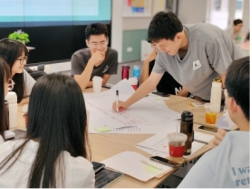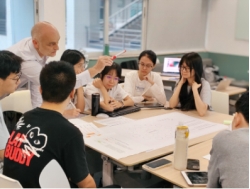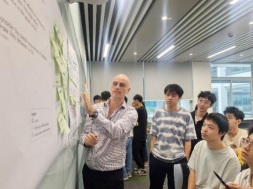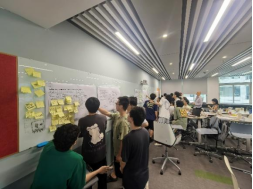In November 2024, the 2021 Civil Engineering Elite English Class from the School of Civil Engineering and Transportation participated in an international university-enterprise joint workshop on intelligent structural design. This workshop is a 2-credit practical course, implemented since 2022, jointly coordinated by Nan Hu from the Department of Civil Engineering and Xiaochun Luo from the Department of Engineering Management. This year, the teaching team invited Arup's Foresight team from the East Asia region to lead students, through a combination of online and offline formats, in an in-depth exploration of the cutting-edge topic in future cities and macro design: Cities on Water. This workshop transformed the traditional course design format into an open platform for exchange and discussion, shifting students from passively doing design work to actively interacting, discussing, and even engaging in lively debates. Moving from macro visions to specific designs, teams worked together to construct floating city scenarios for the Greater Bay Area in 2035.
Online Session: Broadening International Foresight Horizons
The first part of the workshop was conducted online via Teams meetings, taught entirely in English, focusing on the design of future cities on water. Experts from Arup's Foresight team guided students through detailed case studies and macro design explanations to delve into the possibility and necessity of building sustainable urban spaces on water. During this process, students actively participated in interactive discussions, proposing many innovative insights and ideas. The classroom buzzed with sparks of creativity, fostering a constructive exchange atmosphere. This not only broadened their international perspective but also familiarized them with cutting-edge trends in 'Cities on Water' design, mastering the relevant driving forces for change and planning elements. They gained a deeper understanding of the design philosophy for future cities on water and their construction and operational methods. This knowledge provided solid support for the subsequent offline sessions, enabling them to participate more effectively in practical design exercises.
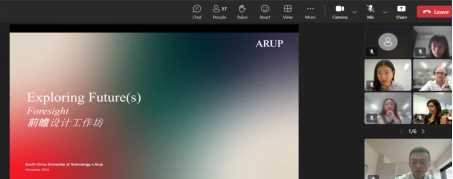
Faculty, students, and the Arup Foresight team during the online teaching session
Offline Session: An Open Stage for Clashing Ideas
The second part of the workshop took place offline in Smart Classroom 302 of Building 33. Guided by Professor Nan Hu and the Arup Foresight team, the session was relaxed, lively, and full of creativity and energy. Through group discussions and design practice, students started with imaginative ideas, gradually focused on the core issues, brainstormed collectively, and actively explored how to translate the 'Cities on Water' concept into concrete design solutions, pushing their thinking from theory to practical application.
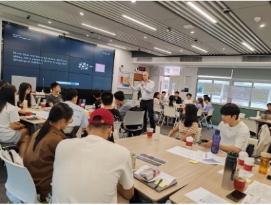
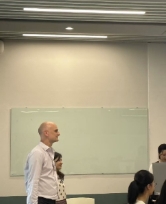
Faculty, students, and the Arup Foresight team during the offline design session
During this process, students used an interactive format of Write, Chat, Draw, Present. They vividly recorded their ideas on paper, engaged in lively debates and in-depth discussions within their groups, shared diverse viewpoints, and finally presented their work to other groups for mutual learning and inspiration. This novel classroom format brought a fresh learning experience and provided valuable opportunities to practice communication and presentation skills. Through this interactive learning method, students actively thought and discussed deeply while writing and speaking, forming unique insights into the construction of cities on water. It enhanced the students' design capabilities and teamwork spirit, while also cultivating their keen insight into future urban development, laying a solid foundation for their future studies and practice.
|
|
|
|
On-site workshop discussion
Notably, during this workshop, students fully utilized AI drawing tools to create planning blueprints for the floating cities, generating partial and macro models of future cities based on their own concepts. Leveraging advanced AI technology and interacting with AI tools, they could quickly transform abstract ideas into visual images, experiencing the wide application of emerging technologies in the civil engineering field through this interdisciplinary learning approach. By combining traditional design concepts with modern technology, students could more efficiently translate creativity into practical designs, expanding the boundaries of design and deepening their vision for the construction of future cities on water.
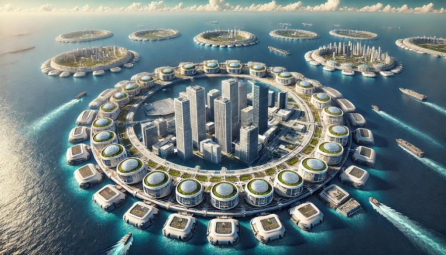
Scenario design based on Generative AI (Example of student team work)
Conclusion
This intelligent structural design workshop innovated the teaching model, broadened students' forward-looking engineering design thinking, stimulated their enthusiasm for exploring the future development directions of civil engineering, and injected new vitality into the school's teaching reforms. This was both a bold attempt to bring industry into the classroom and strengthen university-enterprise cooperation, and an exploration of curriculum reform adapting to the growth needs of students in the new era. In the future, the school will further implement university-enterprise collaboration within the Guangdong-Hong Kong-Macao Greater Bay Area. Building on the cooperation with renowned international engineering consulting firms, the school will intensify reforms in classroom teaching and practical sessions, comprehensively upgrade the advanced nature and challenge level of all aspects of talent cultivation, and improve the overall quality of the School's undergraduate programs.
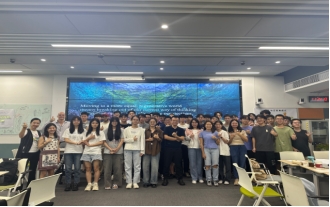
Group photo of faculty, students, and the Arup Foresight team

